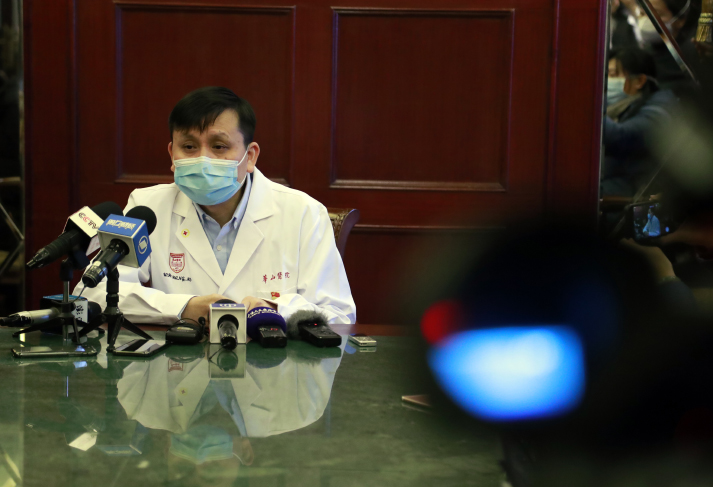| China |
| Leading by Example | |
| Infectious disease expert saves lives, kills rumors and inspires others | |
|
|
 Zhang Wenhong, Director of the Infectious Disease Department of Huashan Hospital in Shanghai, speaks at a news conference on January 29 (CNSPHOTO)
A 21-hour work schedule is the new normal for Zhang Wenhong, a leading infectious disease expert in Shanghai who has been in the forefront of many medical battles, including the severe acute respiratory syndrome (SARS) epidemic in 2003. On January 28, a typical day in the life of the director of the Infectious Disease Department of Huashan Hospital, Zhang monitored the novel coronavirus situation in Henan Province in central China, where he had been sent by the national health authorities, during the day. At midnight, he took a flight back to Shanghai, then updated the situation on his department's WeChat social media account with his analysis. It was 3 a.m. when he went to sleep, but by 6 a.m. he was up to get back to his hospital where patients were waiting for him. After that day's work, Zhang attended a press conference on the prevention and control of the outbreak, where he warned that people have to prepare for a prolonged battle. The first novel coronavirus case in Shanghai was reported on January 15. At that time, little was known about the dangers involved. "The first batch of medical staff dared to expose themselves to the virus without knowing anything about the risk, transmissibility and pathogenicity of the disease," Zhang said. He set up the medical observation criteria for his younger colleagues, explaining which patients should be kept under observation and which ones should be discharged. As he sees it, infectious disease doctors' responsibility goes beyond treatment to making reasonable decisions, precise assessments and suggestions for control policies. Zhang credits his métier to his mentor, 82-year-old Wen Xinhua, who led Shanghai's SARS defense in 2003. No health workers were infected in Shanghai then and there were no cases of group transmissions, a feat acknowledged by the World Health Organization. Zhang, who worked with Wen, edited a book on SARS in China. Zhang's medical team is also running an information campaign on WeChat. His department's account, Huashan Ganran, has become an opinion leader and must-check content for many people. It provides updates on the situation almost everyday, along with prevention tips, scientific explanations and information on policies to ease people's anxiety. It also has a song to encourage followers. Zhang's students, some of whom are also his colleagues, collect the information and he writes articles based on it at night. "People need to be informed of the facts. General consensus, particularly consensus on science, is key to the prevention and control work of infectious diseases," he said. Among the 10 articles on the novel coronavirus outbreak posted as of January 29, one had been viewed 10 million times. On February 2, Zhang also posted a 10,000-character digital book on prevention and control of the epidemic. A week later, more content was added based on the progress in the work. During the SARS epidemic, this trend of doctors posting articles online to answer the worried public's questions and refute rumors was not so visible. With more professional medical information available on various platforms in a transparent way, people can discern between the truth and rumors more easily and get back to their work with less panic. On January 18, when most Chinese people were getting nervous triggered by the unknown virus, Zhang delivered a public speech about infectious diseases that has been massively reposted. This speech was planned half a year ago by Zhang together with Beijing-based CC Talk, a non-profit opinion-sharing platform for professionals. Zhang reviewed the 1918 virus that killed at least 50 million people and SARS, attributing the panic to the failure of tracing the virus and public health measures. "When people enjoy the blue sky or the deep ocean, so do viruses. The risk of being infected is always there," Zhang said. However, the current progress of genetic science has offered a method of knowing a virus which tends to trigger panic. He compared infectious disease doctors to virus hunters who are dedicated to looking for the solutions to possible virus outbreaks thanks to the mutation of viruses. As for when viruses could be eradicated at all, Zhang said they can only hear the clock tick without knowing what time it is. Copyedited by Sudeshna Sarkar Comments to ffli@bjreview.com |
|
||||||||||||||||||||||||||||||
|
